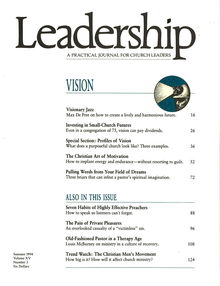1. Men’s Liberation. This part of the movement flows from the secular men’s sensitivity movement of the seventies, which embraced the freedom form traditional sex roles offered by feminism. It encourages men to develop their own “feminine” qualities, such as sensitivity and nurturing.
2. Coaching Models. Since sports is perhaps the major hub of masculine culture in the United States, it has provided a common language for many divergent “coaches of men” to proclaim their message. The closest thing to a Protestant men’s movement is the “Promise Keepers” organization, the brain child of University of Colorado head football coach Bill McCartney.
3. Healing. Gordon Dalbey, author of “Healing the Masculine Soul,” emphasizes that through healing, and particularly healing prayer, the Father God will heal men [from the “father wound”] and allow them to receive and act on exhortation.
4. Fathering. While Dalbey addresses the need for sons to be healed, Ken Canfield, of the National Center for Fathering, moves toward fathers and their needs.
5. Male Sexuality. Leanne Payne, author of “The Broken Image, Healing the Homosexual,” and “Crisis in Masculinity,” applies principles of healing prayer to the problem of male sexual preference.
6. Marriage Advocates. Gary Smalley and John Trent, authors of several Christian books, come to the men’s movement as marriage advocates; their focus is more toward saving marriages than saving men.
Copyright (c) 1994 Christianity Today, Inc./LEADERSHIP Journal
Copyright © 1994 by the author or Christianity Today/Leadership Journal. Click here for reprint information on Leadership Journal.









